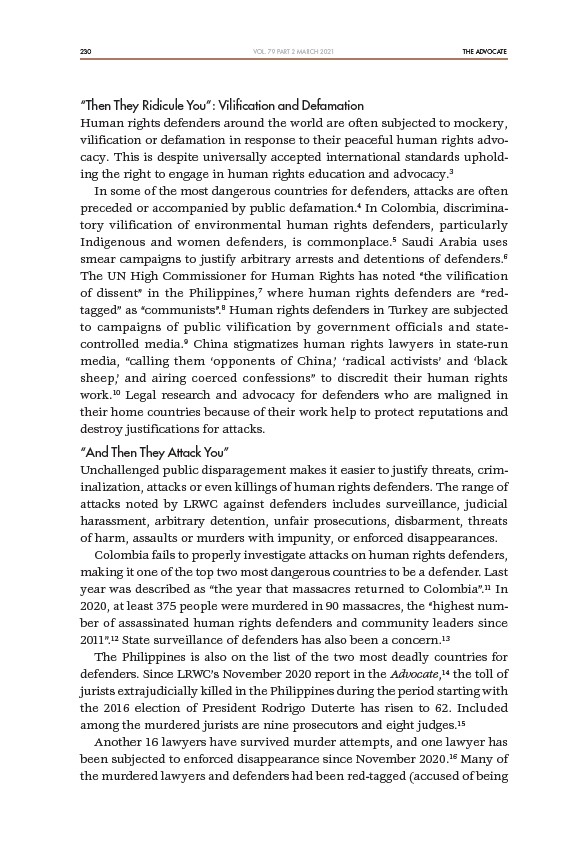
230 THE ADVOCATE
VOL. 79 PART 2 MARCH 2021
“Then They Ridicule You”: Vilification and Defamation
Human rights defenders around the world are often subjected to mockery,
vilification or defamation in response to their peaceful human rights advo-
cacy. This is despite universally accepted international standards uphold-
ing the right to engage in human rights education and advocacy.3
In some of the most dangerous countries for defenders, attacks are often
preceded or accompanied by public defamation.4 In Colombia, discrimina-
tory vilification of environmental human rights defenders, particularly
Indigenous and women defenders, is commonplace.5 Saudi Arabia uses
smear campaigns to justify arbitrary arrests and detentions of defenders.6
The UN High Commissioner for Human Rights has noted “the vilification
of dissent” in the Philippines,7 where human rights defenders are “red-
tagged” as “communists”.8 Human rights defenders in Turkey are subjected
to campaigns of public vilification by government officials and state-
controlled media.9 China stigmatizes human rights lawyers in state-run
media, “calling them ‘opponents of China,’ ‘radical activists’ and ‘black
sheep,’ and airing coerced confessions” to discredit their human rights
work.10 Legal research and advocacy for defenders who are maligned in
their home countries because of their work help to protect reputations and
destroy justifications for attacks.
“And Then They Attack You”
Unchallenged public disparagement makes it easier to justify threats, crim-
inalization, attacks or even killings of human rights defenders. The range of
attacks noted by LRWC against defenders includes surveillance, judicial
harassment, arbitrary detention, unfair prosecutions, disbarment, threats
of harm, assaults or murders with impunity, or enforced disappearances.
Colombia fails to properly investigate attacks on human rights defenders,
making it one of the top two most dangerous countries to be a defender. Last
year was described as “the year that massacres returned to Colombia”.11 In
2020, at least 375 people were murdered in 90 massacres, the “highest num-
ber of assassinated human rights defenders and community leaders since
2011”.12 State surveillance of defenders has also been a concern.13
The Philippines is also on the list of the two most deadly countries for
defenders. Since LRWC’s November 2020 report in the Advocate,14 the toll of
jurists extrajudicially killed in the Philippines during the period starting with
the 2016 election of President Rodrigo Duterte has risen to 62. Included
among the murdered jurists are nine prosecutors and eight judges.15
Another 16 lawyers have survived murder attempts, and one lawyer has
been subjected to enforced disappearance since November 2020.16 Many of
the murdered lawyers and defenders had been red-tagged (accused of being